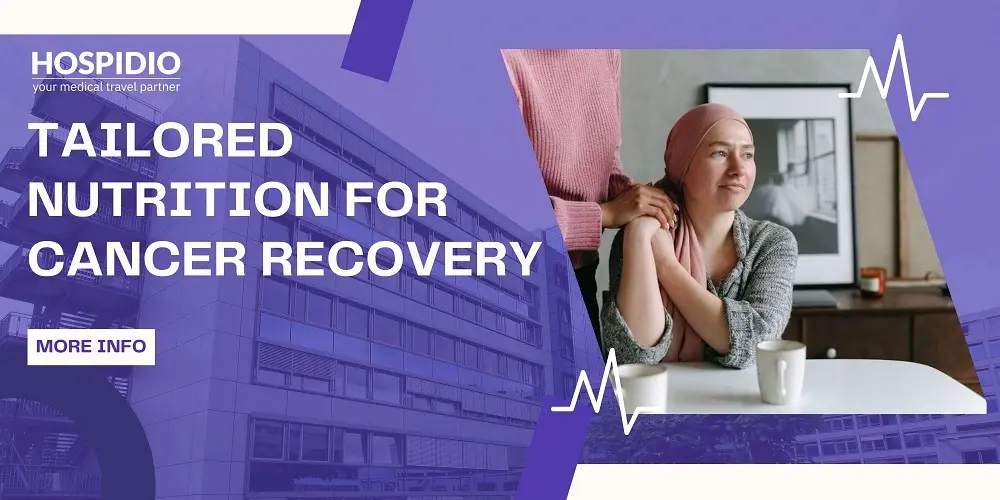Cancer is more than a medical diagnosis — it’s a life-altering experience that affects the body, mind, and spirit. While chemotherapy, radiation, immunotherapy, and surgical interventions remain the cornerstone of conventional treatment, there’s growing awareness of another key player in the healing journey: nutrition. Far from being a supplementary aspect of care, nutrition plays a central role in supporting physical recovery, enhancing immunity, managing side effects, and restoring quality of life.
Among the most impactful yet underappreciated tools in this realm is the customized diet plan—a nutritional strategy tailored to the individual needs of cancer patients. Personalized nutrition recognizes that each person’s journey with cancer is unique, shaped by the type of cancer, treatment plan, medical history, preferences, and psychological state.
The Link Between Nutrition and Cancer Recovery
The connection between diet and cancer is deeply rooted in science. Malnutrition is a common concern in cancer care, with studies estimating that up to 80% of cancer patients experience some form of nutritional deficiency during treatment. These deficiencies can lead to weight loss, reduced muscle mass, weakened immunity, and poorer outcomes. On the other hand, a well-designed nutritional approach can improve survival rates, reduce complications, and enhance the overall treatment experience.
Get a free cost estimate
Why the Body Needs More During Cancer Treatment
Cancer treatment often causes physiological stress and increases the body’s metabolic demands. Here’s how different treatments influence nutritional needs:
- Chemotherapy can hinder the body’s ability to absorb nutrients, trigger nausea, and decrease appetite.
- Radiation therapy, especially when directed at the gastrointestinal tract or head and neck region, may lead to challenges such as difficulty swallowing, dry mouth, and mucositis.
- Surgery creates a significant need for wound healing and tissue repair, requiring higher protein and micronutrient intake.
- Immunotherapy and targeted therapies may lead to inflammation and gastrointestinal issues that further complicate nutrition.
These factors highlight the importance of adjusting one’s diet to support bodily functions, manage side effects, and prevent additional complications.
How Nutrition Enhances the Healing Process
A personalized nutritional plan goes beyond simply providing nourishment— it becomes a vital component of the overall cancer treatment and recovery process. By carefully aligning dietary choices with the individual’s unique medical and personal needs, nutrition actively supports the body’s ability to heal, tolerate treatments, and regain strength. Here are the key ways in which a thoughtfully crafted diet enhances cancer recovery:
1. Maintaining Body Weight and Muscle Mass
Cancer cachexia — an extreme form of weight and muscle loss — can significantly impair treatment outcomes. Maintaining adequate energy and protein intake helps preserve lean muscle and support daily functioning.
2. Rebuilding Strength and Endurance
Cancer treatment can leave patients exhausted. A nutrient-dense diet can replenish lost vitamins, minerals, and calories, providing the fuel needed for recovery and rehabilitation.
3. Enhancing Immune Function
A weakened immune system is common in cancer patients, making them more vulnerable to infections. Key nutrients such as zinc, selenium, iron, and vitamins A, C, D, and E play a crucial role in boosting and maintaining a strong immune system.
4. Promoting Wound Healing
Post-surgical recovery demands an increased supply of protein, collagen-building amino acids, and healing-supportive micronutrients like vitamin C and zinc.
5. Supporting Emotional and Cognitive Health
There is growing recognition of the gut-brain axis, the connection between gut health and mental well-being. A healthy diet can help alleviate depression, anxiety, and cognitive fog—common symptoms in patients undergoing treatment.
6. Managing Treatment Side Effects
From constipation and diarrhea to loss of appetite and taste changes, a tailored diet can offer relief from common side effects and improve the overall experience of care.
In essence, a customized nutritional plan transforms food from mere sustenance into a powerful therapeutic tool—working hand-in-hand with medical treatments to promote healing, resilience, and renewed hope throughout the cancer recovery process.
The Importance of Personalization: Why One-Size-Fits-All Doesn’t Work
No two cancer patients have the same nutritional needs. Factors such as the type and stage of cancer, the specific treatments being received, genetic predispositions, and existing health conditions all require a carefully tailored nutritional approach. Customized nutrition plans are important because they can:
- Meet unique energy and protein requirements based on the individual’s condition and treatment phase.
- Adjust for challenges like swallowing difficulties, mouth sores, or changes in taste and appetite.
- Manage coexisting health issues such as diabetes, kidney disease, or food allergies without compromising cancer recovery.
- Honor cultural, religious, and personal food preferences to encourage adherence and enjoyment.
For example, a patient with head and neck cancer who experiences trouble chewing or swallowing will benefit from softer, moist foods that are easier to consume, while someone recovering from colon cancer surgery may initially require a diet low in fiber to support healing and reduce digestive stress. Tailoring nutrition in this way ensures that each patient receives the precise support they need for optimal recovery.
Designing a Cancer Recovery Diet: Core Components
A cancer recovery diet must take a holistic approach, carefully balancing both macronutrients—such as proteins, carbohydrates, and healthy fats—and micronutrients, including vitamins and minerals. This comprehensive nutritional strategy ensures the body receives all the essential elements needed to support healing, strengthen the immune system, repair damaged tissues, and maintain overall health throughout the recovery process. By addressing the full spectrum of nutritional needs, a well-rounded diet helps optimize physical resilience and promotes long-term wellness beyond just basic calorie intake.
1. Protein: The Building Block of Recovery
Protein plays a vital role in maintaining muscle mass, supporting immune system recovery, and aiding in the regeneration of cells.
Sources:
- Eggs
- Chicken, turkey, fish
- Tofu, tempeh
- Lentils, beans, chickpeas
- Greek yogurt, paneer, cheese
- Nuts, seeds
Tip: Aim for high-quality protein sources at every meal, especially after chemotherapy sessions or surgery.
2. Hydration: The Forgotten Nutrient
Dehydration can exacerbate fatigue, reduce appetite, and impair kidney function, particularly when medications are in use.
Hydration sources:
- Water
- Coconut water
- Herbal teas (ginger, chamomile, mint)
- Vegetable broths
- Hydrating fruits: watermelon, cucumber, oranges, papaya
3. Antioxidants: Cellular Protection
Antioxidants neutralize free radicals and protect cells from treatment-induced oxidative damage.
Top antioxidant-rich foods:
- Blueberries, strawberries
- Carrots, spinach, kale
- Beets, red cabbage
- Bell peppers, tomatoes
- Citrus fruits
Note: Speak with a dietitian before taking high-dose antioxidant supplements, which may interfere with certain therapies.
4. Healthy Fats: Anti-inflammatory Allies
Unsaturated fats support the absorption of essential vitamins, help regulate hormone levels, and contribute to reducing inflammation throughout the body.
Recommended sources:
- Avocados
- Olive oil
- Walnuts, almonds
- Chia seeds, flaxseeds
- Fatty fish (salmon, sardines)
5. Fiber: Digestive Wellness
Fiber regulates bowel movements and supports gut health, essential during treatment disruptions.
Best choices:
- Oats, quinoa, brown rice
- Lentils, beans
- Apples, pears, berries
- Leafy greens, broccoli
- Chia seeds, psyllium husk
Caution: In case of diarrhea or GI sensitivity, opt for low-fiber or cooked options.
Also Read: Top 10 Cancer Treatment Hospitals in India
Healing Foods to Prioritize
Certain foods are especially beneficial for healing and can be considered staples in a recovery-focused meal plan:
Protein-Rich Foods:
- Boiled eggs
- Lentil soup
- Soft-cooked chicken or fish
- Nut butters and seeds
Rainbow of Vegetables:
- Leafy greens (spinach, moringa)
- Cruciferous vegetables (broccoli, cauliflower)
- Orange vegetables (pumpkin, carrots)
Immunity Boosters:
- Garlic and ginger
- Turmeric with black pepper
- Fermented foods: yogurt, kefir, kimchi
Energy- Sustaining Whole Grains:
- Rolled oats
- Millet
- Whole wheat roti or pasta
- Couscous and bulgur
Foods to Limit or Avoid
While nourishing the body is key, some foods can impair recovery or trigger complications:
- Highly processed snacks: Chips, sugary breakfast cereals, and fast foods often contain trans fats and artificial additives.
- Sugary beverages: Soda and sweetened juices may promote inflammation and fatigue.
- Red and processed meats: Linked to increased cancer risk in some cases.
- Alcohol: May impair liver function, especially during chemotherapy.
- Spicy or acidic foods: May cause irritation to the mouth and stomach lining.
Role of an Oncology Dietitian: A Cornerstone of Care
Oncology dietitians play a crucial role in bridging the gap between medical treatments and effective nutritional therapy, ensuring patients receive the best possible support throughout their cancer journey. Their expertise goes beyond general dietary advice to address the complex and evolving needs that arise during different phases of treatment.
Key responsibilities of oncology dietitians include:
- Assessing Nutritional Status: Through detailed screenings, lab tests, and patient interviews, they evaluate each individual’s nutritional health to identify deficiencies, risks of malnutrition, and specific needs.
- Developing Personalized Meal Plans: They design customized nutrition plans that consider the patient’s type of cancer, stage of treatment, side effects like nausea or mouth sores, and personal food preferences to maximize tolerance and intake.
- Providing Practical Strategies: Oncology dietitians offer creative solutions to overcome common challenges such as loss of appetite, taste changes, swallowing difficulties, and digestive issues, helping patients maintain adequate nutrition even when eating feels difficult.
- Monitoring and Adjusting Plans: As treatment progresses, symptoms and nutritional requirements can change rapidly. Dietitians regularly assess patients' conditions and modify dietary plans to provide consistent and effective support.
- Offering Emotional Support and Education: Beyond nutrition, they provide compassionate guidance and education to both patients and caregivers, empowering them with knowledge and confidence to make informed food choices.
This expert guidance is invaluable in helping patients regain a sense of control over their health—a crucial psychological boost amid the uncertainty and challenges of cancer treatment. Oncology dietitians not only support the physical healing process but also contribute to overall well-being and resilience, making them an indispensable part of the cancer care team.
Overcoming Common Nutritional Challenges in Cancer Recovery
1. Loss of Appetite
- Eat smaller, frequent meals.
- Include calorie-dense snacks: trail mix, smoothies, full-fat dairy.
- Choose cold meals to reduce odor-related nausea.
2. Changes in Taste or Smell
- Use herbs, citrus, or mild spices to enhance flavor.
- Try melamine or foodgrade plastic utensils to reduce metallic taste.
- Provide a diverse range of foods each day to maintain interest and engagement.
3. Nausea and Vomiting
- Ginger tea, plain crackers, and mild, bland foods may provide relief.
- Stay upright after meals.
- Avoid overly greasy or rich foods.
4. Digestive Discomfort
- For constipation: add prunes, oats, and warm liquids.
- For diarrhea: focus on bananas, rice, applesauce, and toast (BRAT diet).
5. Financial Barriers
- Focus on affordable staples: lentils, rice, seasonal vegetables.
- Buy in bulk.
- Freeze leftovers for convenience and savings.
Also Read: Eating Right Before and After Bariatric Surgery
Cultural and Emotional Considerations in Nutrition
Food is much more than just fuel for the body; it holds deep significance as a source of identity, cultural connection, comfort, and cherished memories. During the difficult recovery process, food serves not only as a source of nutrition but also offers emotional comfort and a sense of routine. A well-designed recovery diet should therefore:
- Respect cultural practices to encourage compliance and satisfaction.
- Include familiar dishes, adapted for nutrient needs.
- Involve caregivers and family, creating a support system around mealtimes.
- Support emotional healing, such as reintroducing favorite foods gradually.
Heal Stronger with HOSPIDIO’s Tailored Diet Plans for Cancer Patients
At HOSPIDIO, we understand that recovery from cancer is not just about medical treatment—it’s also about nourishing the body with the right foods. That’s why we offer personalized, evidence-based diet plans tailored specifically for patients recovering from cancer treatment. Our expert nutritionists take into account a variety of factors including local food availability, individual meal preferences, regional climate, and cultural habits to create practical and sustainable nutrition strategies.
Each plan is quantified and customized to meet the unique needs of the patient, helping to rebuild strength, support immunity, and enhance overall well-being. Whether you’re in the midst of treatment or on the path to recovery, our team is here to answer any questions you may have about nutrition and diet. Don’t hesitate to get in touch with HOSPIDIO—we’re committed to supporting you every step of the way.
Emerging Trends in Cancer Nutrition
As research in oncology and nutrition advances, new strategies are emerging that may support cancer patients during treatment and recovery. While not all methods are suitable for everyone, they offer promising avenues for personalized care. Here are some of the leading trends:
1. Nutrigenomics:
This evolving field explores the relationship between a person’s genes and their response to different nutrients. By understanding how specific genes influence metabolism and nutrient absorption, healthcare providers can create personalized nutrition plans. These tailored diets aim to enhance treatment outcomes, minimize side effects, and support long-term health based on individual genetic profiles.
2. Plant-Based Approaches:
Diets rich in whole, minimally processed plant foods—such as vegetables, fruits, legumes, nuts, and whole grains—are gaining recognition for their potential to reduce inflammation and oxidative stress. These effects are particularly relevant for cancer patients, as chronic inflammation can negatively impact recovery and immunity. While not necessarily vegetarian or vegan, these protocols prioritize plant foods as the foundation of the diet.
3. Medical Nutrition Therapy (MNT):
MNT involves using nutrition as a clinical tool, often incorporating specialized products like high-protein powders, oral nutritional supplements, or fortified foods. This approach is especially valuable for patients experiencing unintentional weight loss, poor appetite, or malnutrition due to cancer or its treatment. Dietitians carefully tailor these interventions to meet the patient’s medical and metabolic needs.
4. Intermittent Fasting:
Although still under investigation, some studies suggest that intermittent fasting—short periods of voluntary food restriction—may help enhance the body’s response to chemotherapy and reduce certain side effects. However, this approach is not suitable for everyone and should only be considered under close medical supervision. Patients with cancer often have increased energy and nutrient needs, and fasting may pose risks if not properly managed.
Before diving into any new dietary trend, it’s essential to remember that cancer care is deeply personal—what benefits one person may not suit another. Every patient’s body responds differently to treatment, and nutritional needs can vary widely. That’s why consulting both your oncologist and a registered dietitian is so important. With professional guidance, you can explore nutrition strategies that are not only safe but also tailored to support your unique recovery journey.
Top Cancer Specialists in India
Final Thoughts: Nourishment as Empowerment
Cancer treatment is undeniably challenging and often exhausting, yet nutrition provides a vital and empowering means to regain a sense of control amid the uncertainty. By carefully addressing the body’s unique needs and customizing dietary choices to fit each individual’s specific situation, food transforms from mere sustenance into a powerful tool for healing and restoration—not just survival. Whether you are a patient navigating the difficult path of recovery, a caregiver supporting a loved one, or a healthcare professional guiding treatment, it’s important to recognize that food truly is medicine. When thoughtfully tailored and thoughtfully applied, nutrition supports healing on multiple levels: it helps reduce debilitating fatigue, strengthens the immune system to fend off infections, aids in rebuilding muscle and tissue, and nurtures emotional well-being.
Personalized nutrition extends well beyond symptom management—it is essential for revitalizing energy, improving quality of life, and inspiring hope for the future. In the path to cancer recovery, personalized nutritional support isn’t just helpful—it’s essential.
💡 Considering Your Treatment Options?
Alongside nutrition, understanding your treatment pathway is essential. Learn more about:
Ensure nutrition serves as the foundation of the recovery journey, not merely an afterthought!
Sanjana
Author
Sanjana Sharma is a certified diabetes educator with a solid academic background in nutrition and dietetics. Her qualifications include a BSc in Clinical Nutrition and Dietetics, an MSc in Foods and Nutrition from CCS University, a Diploma in Health and Education from IGNOU, and a certification from NDEP. Dedicated to helping patients manage their health through personalized care and education, she brings expertise and compassion to her work. Outside of counseling and writing, Sanjana loves staying updated with fashion trends, sharing corporate memes on Instagram, and, of course, thinking about food.
Guneet Bindra
Reviewer
Guneet Bhatia is the Founder of HOSPIDIO and an accomplished content reviewer with extensive experience in medical content development, instructional design, and blogging. Passionate about creating impactful content, she excels in ensuring accuracy and clarity in every piece. Guneet enjoys engaging in meaningful conversations with people from diverse ethnic and cultural backgrounds, enriching her perspective. When she's not working, she cherishes quality time with her family, enjoys good music, and loves brainstorming innovative ideas with her team.











